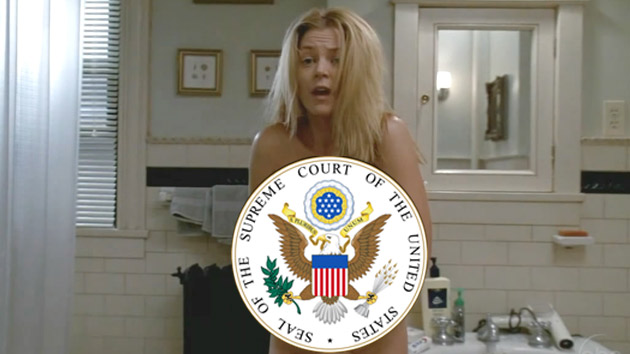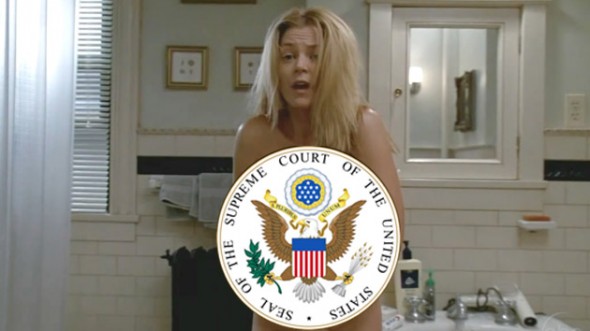This week, the U.S. Supreme Court wriggled out of a tight spot. Network lawyers, creative types, and ordinary viewers were watching the court's docket with interest this year, as the Supremes heard arguments in the case of FCC v. Fox Television Stations. The case revolved around more than $1 million in fines that the Federal Communications Commission had levied against ABC affiliates for airing images of nudity during an episode of NYPD Blue [pictured] as well as a notice of liability for profanity uttered during a live broadcast of the Golden Globes on Fox stations.
Observers had expected the case to culminate in a decision from the Supreme Court that would either invalidate the longstanding prohibition on vaguely defined "indecent" material on the public airwaves or uphold the FCC's authority to regulate over-the-air content. The court did neither. Instead, the justices simply rejected the fines and judgments in question, arguing that the FCC had not specifically notified stations that it would begin punishing brief nudity and "fleeting expletives." Essentially, they sent the FCC back to the drawing board to clarify what types of content are prohibited. And, as Bloomberg points out, the agency now has a backlog of some 1.5 million complaints to pore over, presumably trying to derive some guidance from the non-decision handed down yesterday.
Hardly a landmark ruling. You could even call it a cop-out.
Broadcast networks have been chafing against indecency restrictions for decades, but their discomfort became more pronounced as shows like The Sopranos and Boardwalk Empire on HBO and Weeds and Dexter on Showtime started stealing viewers (not to mention Emmys and Golden Globes) from traditional prime-time programming. You can argue that pervasive brutal violence and nudity doesn't make a network show any better — and you'd be right. (Never mind the fact that compliance with FCC rules doesn't make a show entirely family friendly when creatives decide to push the envelope.)
But an amicus brief [PDF] filed by the National Association of Broadcasters last year argued that there is a distinct chilling effect when broadcasters nix shows because of liability fears. The NAB said a Peabody Award-winning 9/11 documentary, a reading of a Tom Wolfe novel, a memorial service for football star and soldier Pat Tillman, and even a local political debate had been kept off the air by broadcasters worried about getting fined for a passing unbleeped profanity.
What's more, the NAB said, even though the FCC decided that it was OK for broadcasters to air an unedited version of Saving Private Ryan with profanity intact, it was never clear whether any other similarly weighty material would get the same consideration. In one case, PBS edited the Frontline documentary A Company of Soldiers before offering it to affiliates; any station that wanted to air the uncensored version had to sign a waiver accepting sole responsibility for the decision. And in order to stay truly safe, even the smallest broadcasters have to invest in time-delay technology to protect them in the event that something goes awry in a live news report. The NAB cited the example of a broadcaster with 24 local stations who had to spend $200,000 on delay technology.
Even when the technology is in place, somebody has to be poised to decide, with only a moment's notice, whether or not they really need to hit that dump button during a live broadcast. And, last year, local news stations had to decide how to cover a story involving Paul Gauguin's famous painting Two Tahitian Women. (NSFW, maybe?) Many of them opted to blur the breasts of the women in the painting out of fear that those, too, could be deemed "indecent."
The constitutionality of the FCC's effective censorship powers has been questioned ever since the Supreme Court's 1978 "Pacifica" decision first affirmed them. At one time, there was an argument that the scarcity of broadcast spectrum meant there was a compelling public interest in regulation of the companies that were allowed use of that spectrum. But with the proliferation of cable-TV channels that fall outside the FCC's purview, it's unclear that scarcity can still be a consideration, or that the government can effectively protect children simply by holding over-the-air broadcasters to a different standard from their cable-only competitors.
Certainly the Supreme Court's refusal to uphold this most recent round of fines indicates that it, too, is unsure of the extent of government's powers to regulate broadcast content. (In case you were wondering, Janet Jackson's Super Bowl wardrobe malfunction was not one of the incidents covered by this ruling, although it seems likely the Supremes would invalidate those fines, too.) Then again, this is an election year, and any ruling that the FCC's oversight is unconstitutional would likely become a political football. It may be understandable that the Supreme Court justices didn't want to stir this particular pot, especially if they would have had difficulty coming to a consensus on a ruling that would specifically address the bounds of the FCC's authority over content. (Yesterday's ruling, for what it's worth, was unanimous.)
They certainly did the broadcast industry no huge favor. Unless the FCC becomes atypically proactive in spelling out what you can and can't say, and show, on television, broadcasters will continue to play a guessing game — and the smallest stations, including public broadcasters who can hardly afford the five- and six-figure fines that are commonplace, have the most to lose.
By the way, if you're curious about the NSFW NYPD Blue scene that precipitated this whole case, it's (unsurprisingly) not hard to find on the Internet. Here's a lightly censored version, with pop-up commentary.
Did you enjoy this article? Sign up to receive the StudioDaily Fix eletter containing the latest stories, including news, videos, interviews, reviews and more.


Leave a Reply